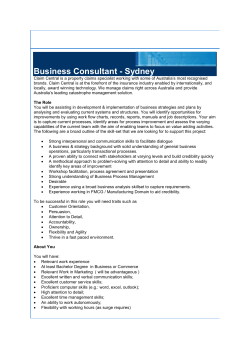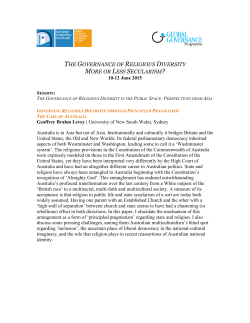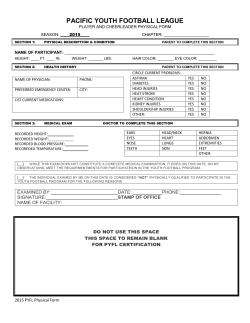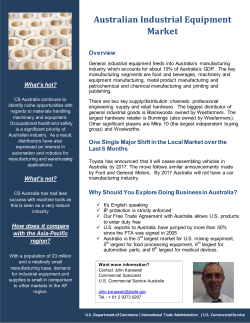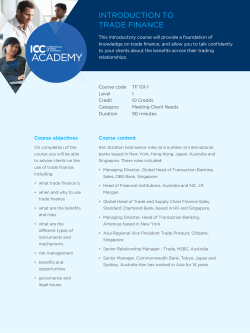
WorkCover WA Injury Management Conference 2015 Program
WorkCover WA Injury Management Conference 2015 Program Outline Tuesday 5 May 2015 8:00 Registration opens 8:45 – 9:05 Official Opening Master of Ceremonies, Karen Tighe, welcomes delegates Welcome to Country, Ms Ingrid Cummings Kart Koort Wiern Michelle Reynolds, Chief Executive Officer 9.05 – 9.15 The Hon. Michael Mischin MLC, Attorney General: Minister for Commerce 9:15 – 10:00 Managing Sick and Injured Workers – A Question of Leadership Commissioner Wayne Gregson APM (Department of Fire and Emergency Services) Over the last three years the Department of Fire and Emergency Services has significantly reformed its approach to managing injured workers, resulting in considerable costs savings and improved lost time injury rates. Commissioner Gregson will share the drivers for this reform, the role of the senior leadership group in implementing it, and whether the outcomes have met expectations. 10:00 – 10:30 Psychological Injury Claims Management and Return to Work: Qualitative insights Dr Bianca Brijnath (Monash University) Mental health conditions are an increasing reason for claiming injury compensation in Australia; however little is known about how these claims are managed. Dr Brijnath will share her analysis of management of mental health claims and the return to work barriers for people with a mental health claim or psychological injury. 10:30-10.45 MC update (Karen Tighe) 10:45 – 11:15 Morning Tea 11:15 – 11:50 Concurrent Sessions Stream One Managing work-related psychological injury 25 minutes Early intervention in psychiatric injury: Influencing a better outcome Dr Gemma Edwards-Smith (CEO Western Psychiatry, Consultant Psychiatrist and Fellow of Royal Australian and New Zealand College of Psychiatrists) The average estimated cost of each mental health related claim is over $250,000, far greater than any other injury or illness category. Early intervention is critical to the successful management of psychiatric injuries. Learn how to engage the right support at the right time to influence successful outcomes for all. 10 minutes Questions 11:50 – 11:55 Break 11:55 – 12:45 Practical Approaches to the Management of WorkRelated Psychological Injury: A clinician’s perspective Michael Tunnecliffe (Director/Clinical Psychologist, BSS Employee Assistance) For employees with a work-related psychological injury, diagnosis and treatment can be confusing. Learn more about factors impacting return to work and hear suggestions on how to manage work-related psychological injury. 40 minutes Stream Two Injury Management Challenges 25 minutes 10 minutes 20 minutes 20 minutes The ageing workforce – what works? Joe Therkelsen (Workers Compensation Manager, Betchel Australia) A maturing workforce provides a number of specific benefits and challenges. Find out how focussing on the whole working life, and an integrated age management strategy will keep mature workers engaged and empowered. Questions Increasing the impact of telehealth in rural and remote Western Australia Dr Angus Turner (Consultant Ophthalmologist, Lions Eye Institute) Access to health in rural and remote communities in Western Australia can be challenging. How can Telehealth improve health outcomes and timely access to treatment? What influence could Telehealth have on injury management outcomes in these areas? 5 years on: what are injured workers telling us? A synopsis of feedback from Injured Workers’ seminars Mr Martin Ralph (Managing Director, IFAP) Since their commencement in November 2006, hundreds of injured workers, their partners and families have attended the free injured workers seminars delivered by IFAP on behalf of WorkCover WA. Hear valuable insights gathered from the candid conversations between the facilitators and attendees on their journey to recovery. 10 minutes Questions 12:45 – 1:45 Lunch 1:00 – 1:30 Lunchtime vignettes (optional) DFES: A journey of reform Karen Roberts (Director Human Resources, DFES) & Sheree Yorke (Injury Management Consultant, DFES) Be part of a conversation with DFES staff about the tools, resources and strategies developed to support improved outcomes for sick and injured workers. WCWA IM Conference Program 2015 – v1 10 minutes Questions 1 Program is current as at 19 February 2015. Program and timing is subject to change. 1:45 – 2:45 Concurrent Sessions Stream One Managing work-related psychological injury 20 minutes 20 minutes Managing pscyhological injuries upstream Annika Demasi (Consultant Psychologist, Demasi Consulting) Practical advice on navigating the sensitivities and challenges when managing employees with a psychological injury. Mental Health First Aid with FIFO workers Stephen Dowling (Community Ambassador, RU OK? Foundation) Stream Two Injury Management Challenges 20 minutes 20 minutes The injury management journey: Woolworths case study Simon Davey (Relationship Manager, Group W orkers’ Compensation – Woolworths Limited) A case study detailing Woolworths’ approach to reforming injury management within the organisation listing specific examples and benefits derived from innovative organisational practices. 20 minutes Case story success – managing injuries at a distance Samantha Breust (State Manager WA, ORS Group and ARPA Award Winner 2013 and 2014) The winner of the Australian Rehabilitation Providers Association’s 2013 and 2014 Outstanding Return to Work Achievement Awards will share insights into the challenges facing return to work in remote Western Australia. Drawing on lessons learnt by the RU OK? Foundation and Mental Health First Aid Australia, Stephen will provide health and wellness strategies for FIFO workers. 20 minutes 2:45 – 2:50 2:50 – 3:30 30 minutes Mates in Construction Godfrey Baronie (Chief Executive Officer, Mates in Construction) A unique approach to incorporating training in the workplace to build awareness about the importance of good mental health and the behaviours that could indicate someone may be struggling. Line managers- the key to injury management success Linda Thompson (Services Manager, RiskCover) and Michael Johnston (Injury Management Advisor, RiskCover) Engaging managers during injury management can be challenging. RiskCover will share an evaluation of line managers’ attitudes and behaviours following basic injury management training and explore techniques to encourage managers to become leaders in the injury management process. Break Panel discussion: Managing complex disputes Participate in a discussion with leading industry experts as WorkCover WA explores the management of complex disputes through the Conciliation and Arbitration Services, particularly those associated with psychological injuries and selfrepresented parties. Panel Members: Professor Tania Sourdin, Monash University, Centre Director, Australian Centre for Justice Innovation Mr Shane Melville, Registrar District Court WA 30 minutes 10 minutes Australia’s future workforce challenges Sanchia Tolomei (Director People and Change, PricewaterhouseCoopers) Australia’s future workforce demographics are set to change. How will WA’s workers’ compensation and injury management sector be affected by these changes? PwC will show us how they have explored and resolved these challenges with a number of client organisations. 10 minutes Questions 3:30 – 4:00 Afternoon Tea 4:00 – 4:45 Prevention to Recovery: Workplaces as a catalyst for better mental health Mr Timothy Marney (Mental Health Commissioner WA) Mr Marney has been a vocal advocate for mental health issues and has spoken openly of his own experience with depression and anxiety. Share Mr Marney’s insights on the future directions of mental health in Western Australia. 4:45 – 5:00 Closing Remarks (Karen Tighe) 5:15 – 7:15 Cocktail Reception WCWA IM Conference Program 2015 – v1 Questions 2 Program is current as at 19 February 2015. Program and timing is subject to change. WorkCover WA Injury Management Conference 2015 Program Outline Wednesday 6 May WorkCover WA Injury Management Conference 2015 Program Outline Wednesday 6 May 2015 8:00 Registration opens 9:00 – 9:10 Day Two Welcome Master of Ceremonies, Karen Tighe 9:10 – 9:50 Health Benefits of Work Dr Steven Overmeire (Occupational Physician, MBBS GDOEH FAFOEM) Managing difficult psychosocial issues does not fit easily into the traditional medical model or the time constraints of primary health care. The longer someone remains off work, the less likely it becomes that they will ever return. Dr Overmeire will present evidence on the health benefits of work in promoting recovery and preventing long term work disability. 9:50 – 10:30 Designing Good Work: What, Why, Who and How Professor Sharon Parker (University of Western Australia) What constitutes ‘healthy work’? Professor Parker will share research on good psychological work design and challenges involved in designing healthy work. 10:30-10.45 MC update (Karen Tighe) 10:45 – 11:15 Morning tea 11:15 – 11:55 Concurrent Sessions 30 minutes 10 minutes Stream One Body Stressing: The big picture Stream Two Injury Management Challenges Systematic early intervention in musculoskeletal injuries Professor Michael Nicholas (Kolling Institute of Medical Research, Royal North Shore Hospital) Musculoskeletal injuries comprise the majority of workers’ compensation injuries. Sprains and strains account for over 50% of all lost time claims in WA. Consider approaches to minimise poor injury management outcomes for these claims from a systems perspective. 30 minutes Recipe for Recovery: Injury management with a contract and labour hire workforce Sam Wilson (National Workers’ Compensation Manager, Skilled Group) Discover approaches to injury management when your worker is performing work at another organisation’s workplace. 10 minutes Questions Questions 11:55 – 12:00 Break 12:00 – 12:45 Excessive sitting – the new RSI of our time? Professor Leon Straker (Director of Research and Higher Degree Programs, Curtin University) Computing advances have slowly expanded sitting based work worldwide. How can you improve your work systems now and into the future? 35 minutes 10 minutes Questions 10 minutes 12:45 – 1:45 Lunch 1:00 – 1:30 Lunchtime vignettes (optional) 35 minutes 1:45 – 2:30 The impact of ageing of the workforce on claims rates and injury outcomes: the role of chronic disease and use of opiod analgesics Dr Janneke Bereke-Gisolf (Monash University) The Australian workforce is aging at a higher rate than the general population. Increasing age is associated with lost productivity in terms of work-related injury rates and time until return to work. Dr Bereke-Gisolf will focus on the challenges of physical comorbidity, mental health and long- term opioid pain treatment. Questions WorkCover WA presentations WorkCover WA scheme updates and statistical trends (Leona Glasby, Manager Research and Evaluation) Legislative Review (Chris White, General Manager Scheme Information and Legislation) Concurrent Sessions Stream One Body Stressing: The big picture Beliefs are central to the rehabilitation of injured workers Dr Darren Beales (Specialist Musculoskeletal Physiotherapist & NHMRC Research Fellow, Curtin University) Beliefs are a central factor driving behaviour. This is as true for a healthcare provider or insurance worker as it is an injured worker. The importance of beliefs and their powerful effects in relation to an injured workers’ journey will be explored using research performed in the West Australian workers’ compensation system. 20 minutes 20 minutes Translating current knowledge into improved outcomes for injured workers Dr Tim Mitchell (Specialist Musculoskeletal Physiotherapist & Research Fellow, Curtin University) A Clinical Translation Framework for musculoskeletal disorders developed at Curtin University helps provide a practical platform for identifying key factors contributing to each individual’s disorder. Discover its potential for promoting more effective team management of complex musculoskeletal claims. WCWA IM Conference Program 2015 – v1 Stream Two Injury Management Challenges 30 minutes 10 minutes A pathway to new employment James Meldrum (National Performance Manager, Advanced Personnel Management) The Job Pathways Program is a structured approach to vocational change including assessment, planning and job-seeking activities. Learn how this delivers successful results to both job seekers and employers. Questions 3 Program is current as at 19 February 2015. Program and timing is subject to change. 2:30 – 2:35 2:35 – 3:15 Break Panel discussion: Preventing delayed recovery and return to work outcomes for body stressing injuries. 40 minutes 30 minutes Motivational Interactions: Engaging Workers in Return to Work Arthur Papagiannis (AP Psychology & Consulting) An introduction to the core concepts of motivational interactions required to better facilitate worker engagement, drive client centred behaviour change and help deliver positive return to work outcomes. 10 minutes Questions Panel members: 3:15 – 3:45 Professor Leon Straker (Director of Research and Higher Degree Programs, Curtin University) Dr Darren Beales (Specialist Musculoskeletal Physiotherapist & NHMRC Research Fellow, Curtin University) Dr Tim Mitchell (Specialist Musculoskeletal Physiotherapist & Research Fellow, Curtin University) Afternoon Tea 3:45 – 4:15 Plenary session Brad Ness Brad is a below the knee amputee as a result of a workplace accident when he was 18. This has not stopped him from achieving his goals and aspirations. Back working on boats within six months, the four time Paralympian and Captain of the Australian Men’s Wheelchair Basketball team will share his return to work journey and his passion for motivating people of all ages to achieve their dreams. 4:15 – 4:45 Plenary session Dr Keith Suter Join Dr Keith Suter, global futurist, highly regarded social commentator, strategic planner and broadcaster as he concludes the conference with a commentary of his perspective of two days with an insight into workforce challenges into the future, international responses and trends to workplace injury. 4:45 – 5:00 Closing Remarks WCWA IM Conference Program 2015 – v1 4 Program is current as at 19 February 2015. Program and timing is subject to change.
© Copyright 2025

